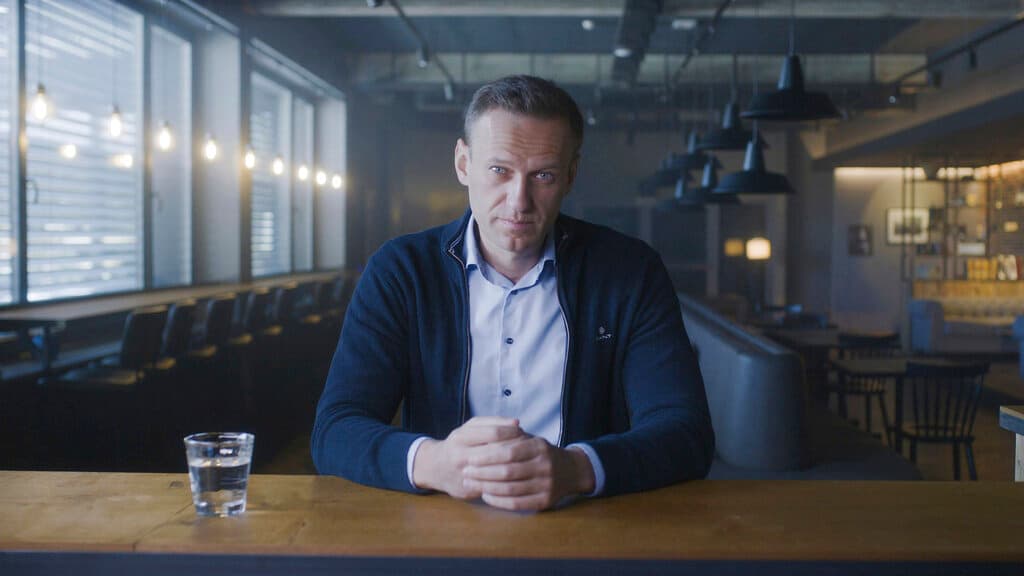Navalny We Hardly Knew You
The courageous Russian dissident dies in prison in Siberia — just when Russia, and America, need him more than ever.

“The last time I saw Alexei Navalny,” our James Brooke emails us this morning, “he talked so long at a dinner I hosted in a subterranean Moscow restaurant that I slipped away after three hours. He was smart, articulate, passionate, and unstoppable. . . ” Until, sadly, Friday, when, after taking a walk in prison, Russian prison authorities say, he collapsed into unconsciousness. Medical help arrived but was unable to revive him. At age 47, the leading opponent of the Putin regime died.
A video posted on X shows Navalny in good health yesterday. Yet regardless of how he died at the “Polar Wolf” Arctic penal colony where he was serving a 30-year sentence, the blame attaches to Mr. Putin. “It’s not ‘Navalny died,’ but ‘Putin killed Navalny,'” is the way a message from exile sent by Navalny’s chief of staff, Leonid Volkov, characterizes Navalny’s death. In the Russia of Mr. Putin, a former KGB agent, that is the way in which enemies of the tsar are dealt with.
There is no doubt that Alexei Navalny was a formidable enemy of the authoritarian regime that currently has Russia in its grip. A lawyer, Navalny created Rospil, a website that documented corruption of the “crooks and thieves” who run Putin’s Russia. Tens of millions of Russian Internet users watched his video exposing a billion dollar hyper luxurious dacha that a businessman was building for Mr. Putin on the Black Sea Coast.
“I can’t stop myself from fiercely, wildly hating those who sold, pissed away, and squandered the historical chance that our country had in the early nineties,” Navalny said. Navalny, with his wife Yulia, son, and daughter, represented a breath of fresh air in Russia. It was for a democratic alternative for the new generation for, in terms of land, the world’s largest country. He drew 100,000 protesters in the out-of-doors — in February.
Many saw Navalny as Russia’s future president. He was, it could be said, president for, among others, the 1 million middle class Russian men who left the country to avoid getting sucked into Mr. Putin’s war on Ukraine. As his popularity grew, Navalny emerged as Mr. Putin’s top rival. Handling Navalny’s followers with care, Mr. Putin funneled billions of dollars into urban improvements in Moscow and St. Petersburg — parks, pedestrian streets, and film festivals.
After the war started, Mr. Putin tailored his military draft to spare the big cities and, instead, to focus on prisons, minorities, and Russians living in remote, flyover regions. Exposing Russia’s obscenely wealthy leadership, meantime, was a sure way to antagonize the Soviet-era ruling circle. After Navalny was poisoned with a nerve agent in 2020, he created a video that included a telephone interview with one of his government poisoners. Navalny spurned exile, refusing the role Russia’s president had assigned him — exile.
Now facing a political funeral for Navalny, Mr. Putin has to decide about a memorial march. In a country where over 150,000 websites are blocked, Putin’s grip on power is not as strong as it seems. Six months ago, he faced a smaller challenge with the death of another political rival, mercenary leader Yevgeny Prigozhin. Then, his people played a shell game, sending out different tips on which cemetery would be the resting place for the man who marched on Moscow.
The death of Navalny is guaranteed to haunt Mr. Putin for the rest of his time in power. Seemingly in good health, Navalny’s last post on Telegram was a Valentine’s Day message to Yulia, below a picture of them together. He wrote: “Baby, you and I have everything like in the song: cities between us, airfield take-off lights, blue blizzards and thousands of kilometers. But I feel that you are there every second, and I love you more and more.” Today, his widow met in private with Secretary of State Blinken.
That was at the Munich Security Conference. She stepped before the lights of the conference hall. “Both this regime and Vladimir Putin must bear personal responsibility for all the terrible things they have been doing to my country, to our country, Russia, in recent years,” Mrs. Navalnaya said. “I want Putin, his entire entourage, Putin’s friends, his government to know that they will bear responsibility for what they did to our country, to my family, to my husband. And this day will come very soon.”

